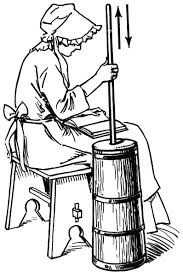
记忆方法
1. corn, grain, kernel => churn.
2. describing the "grainy" appearance of churned cream.
2. describing the "grainy" appearance of churned cream.
中文词源
churn 剧烈搅动
词源可能同grain, 谷物,颗粒,因奶油剧烈搅拌后颗粒状的外观而引申此词义。
英语词源
- churn
-
churn: [OE] It has been speculated that the term churn is based on the granular appearance cream takes on as it is stirred or agitated. The Old English noun cyrin comes from a prehistoric Germanic *kernjōn, which may be related to English corn and kernel and Latin grānum ‘grain’. The derived verb churn is a comparatively late creation, not appearing until the 15th century.
=> corn, grain, kernel - churn (n.)
- Old English cyrin, from Proto-Germanic *kernjon (cognates: Old Norse kirna, Swedish kärna, Danish kjerne, Dutch karn, Middle High German kern); probably akin to cyrnel "kernel" (see kernel) and describing the "grainy" appearance of churned cream.
- churn (v.)
- mid-15c., chyrnen, from churn (n.). Extended senses are from late 17c. Intransitive sense is from 1735. Related: Churned; churning. To churn out, of writing, is from 1902.
权威例句
- 1. Ferries churn the waters of Howe Sound from Langdale to Horseshoe Bay.
- 渡船搅起豪湾的海水,从兰代尔驶向霍斯舒湾。
- 2. He began to churn out literary compositions in English.
- 他开始用英文创作大量的文学作品。
- 3. Butter is made by shaking up cream in a churn.
- 黄油是通过在搅拌桶里搅拌牛奶制成的.
- 4. They churn out 3 000 identical toy trains every day.
- 他们每天生产3000辆一式一样的玩具火车.
- 5. The tractor churn ed up the soil.
- 拖拉机翻起土坡.
